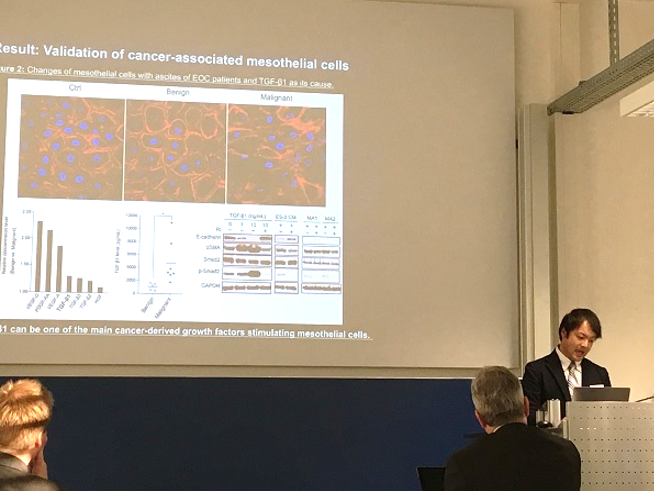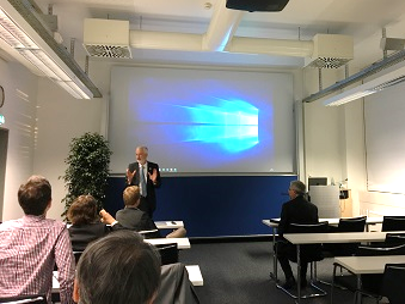6th international symposium between University of Freiburg, The University of Adelaide and Nagoya University was held on October 6, 2017 at the research facility building, University of Freiburg. This is symposium is held every year by rotating between three universities and it us our 6th symposium.
Prof. Kerstin Krieglstein, Dean, Faculty of Medicine, University of Freiburg gave opening remarks at the beginning of the symposium followed by neuroscience and oncology presentations from participants from each university.
In the neuroscience session, Prof. Kinji Ohno and Prof. Hiroshi Kiyama gave a presentation as well as 2 researchers from University of Freiburg. Total of 9 researchers gave a presentation in the oncology session, and lively discussions were taken place. In addition, PhD students participated the symposium as usual, and four PhD students from three universities gave a presentation this year. All the presentations were impressive, and active discussion was taken place.
Along with the academic symposium, a joint strategy meeting between three universities was held, and the three universities exchanged opinions in regard with the management policies of the joint degree program that the three universities are actively involved in.
We discussed about the future management policies with the University of Adelaide, which has already established a joint degree program with Nagoya University; moreover, we discussed how to proceed International Collaborative Program in Comprehensive Medical Science between University of Freiburg and the Nagoya University and confirmed the contents of the agreement that we aim to establish next year.
At our 6th symposium, the presentations and discussions were took placed in a harmonious manner. Not only the three universities deepened the relationship through the research field but also deepen the understandings in regard with strategic policies of the joint degree programs. Further progress in the educational research is expected between each university.
Program
Venue: Institute of Molecular Medicine and Cell Research, Center for Biochemistry and Molecular Cell Research, Stefan-Meier-Straße 17, Freiburg, Seminar Room, 1. Floor
Opening remarks:Prof. Kerstin Krieglstein, Dean, Faculty of Medicine
Session 1: Nuroscence
1.Prof. Hiroshi Kiyama (Nagoya)
Microglia as a determinant of injured neuron fate
2.Prof. Marco Prinz (Freiburg)
From the yolk sac to neurodegeneration: the many facets of microglia
3.Prof. Kinji Ohno (Nagoya)
Decoding aberrant splicing code in human diseases
4.Dr. Jan Pruszak (Freiburg)
Neural stem cells - from basic biology to biomedical applications
5.Hung Chi Jung (Nagoya)
The effect of double ablation (orexin and MCH neurons) on sleep/wakefulness regulation
Session 2: Oncology
1.Prof. Alastair Burt (Adelaide)
Fatty liver disease and hepatocarcinogenesis: a growing concern
2.Priv.-Doz. Dr. Susanna Minguet (Freiburg)
From tumor invasion to immunotherapy
3.Nadia El-Khawanky (Adelaide)
CD123 Chimeric Antigen Receptor T-cells in Chronic and Acute Myeloid Leukaemia: pre-clinical in vitro studies
4.Vincent Soon Wei Wong (Adelaide)
Characterizing the role of ZEB2 in the CD4+ T cell compartment
5.Prof. Andrea Yool (Adelaide)
Controlling cancer metastasis by targeting aquaporin channels with novel pharmacological agents
6.Prof. Tilman Brummer (Freiburg)
Braf in colon cancer
7.Dr. Luke Selth (Adelaide)
Towards improved treatment of prostate cancer: novel strategies to target the androgen receptor
8.Masato Yoshihara (Nagoya)
Carcinoma-associated mesothelial cells promote progression of peritoneal dissemination and acquired platinum resistance in epithelial ovarian cancer
9.Dr. Alejandro Gomez-Auli (Freiburg)
Secretome changes mediated by Cathepsin B in tumor-stroma Interactions



